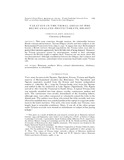| dc.contributor.author | Makgala, C.J. | |
| dc.date.accessioned | 2010-06-16T13:11:43Z | |
| dc.date.available | 2010-06-16T13:11:43Z | |
| dc.date.issued | 2004 | |
| dc.identifier.citation | Makgala, C.J. (2004) Taxation in the tribal areas of the Bechuanaland Protectorate, 1899-1957, Journal of African History, Vol. 45, pp 279-303 | en_US |
| dc.identifier.issn | 0021-8537 | |
| dc.identifier.uri | http://hdl.handle.net/10311/512 | |
| dc.description.abstract | This essay examines, through taxation, the relationship between
British colonial administrators, Tswana Dikgosi (chiefs) and their subjects in the
Bechuanaland Protectorate from 1899 to 1957. It argues that since Bechuanaland
became a British territory through negotiations the Tswana rulers were able to
protect their interests aggressively but with little risk of being deposed. Moreover,
the Tswana succession system by primogeniture worked to their advantage
whenever the British sought to replace them. Taxation was one arena where this
was demonstrated. Although consultation between the Dikgosi, their subjects and
the British was common, subordinate tribes sometimes fared badly under Tswana rule. | en_US |
| dc.language.iso | en | en_US |
| dc.publisher | Cambridge University Press | en_US |
| dc.subject | Botswana | en_US |
| dc.subject | Chieftancy | en_US |
| dc.subject | Accommodation to colonialism. | en_US |
| dc.subject | Southern Africa | en_US |
| dc.subject | Colonial administration | en_US |
| dc.title | Taxation in the tribal areas of the Bechuanaland Protectorate, 1899-1957 | en_US |
| dc.type | Published Article | en_US |

